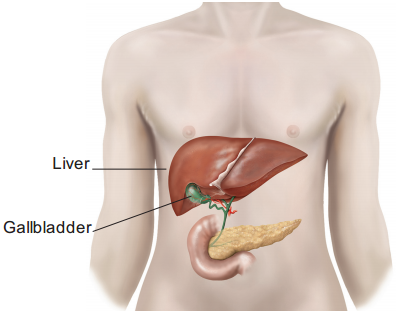What are gallstones?
Gallstones are stones that form in your gallbladder (see figure 1). They are common and can run in families. The risk of developing gallstones increases as you get older and if you eat a diet rich in fat. For some people gallstones can cause severe symptoms, with repeated attacks of abdominal pain being the most common.
What are the benefits of surgery?
You should be free of pain and able to eat a normal diet. Surgery should also prevent the serious complications that gallstones can cause.
Are there any alternatives to surgery?
It is possible to dissolve the stones or even shatter them into small pieces but these techniques involve unpleasant drugs that have side effects and a high failure rate. Antibiotics can be used to treat any infections of your gallbladder. Eating a diet low in fat may help to prevent attacks of pain. However, these alternatives will not cure the condition and symptoms are likely to come back.
What does the operation involve?
The operation is performed under a general anaesthetic and usually takes about an hour. Your surgeon will make several small cuts on your abdomen. They will insert surgical instruments, along with a telescope, inside your abdomen and perform the operation. Your surgeon will free up your cystic duct and artery. They will separate your gallbladder from your liver and remove it.
What complications can happen?
1. General complications
- Pain
- Bleeding
- Infection of the surgical site (wound)
- Unsightly scarring
- Developing a hernia in the scar
- Blood clots
2. Specific complications
- Damage to structures such as your bowel, bladder or blood vessels
- Developing a hernia near one of the cuts
- Surgical emphysema
- Leaking of bile or stones
- Retained stones
- Continued pain
- Diarrhoea
- Inflammation of the lining of your abdomen
- Allergic reaction
- Bile duct injury
- Bowel injury
- Serious damage to your liver
How soon will I recover?
You should be able to go home the next day. You should be able to return to work after two to four weeks, depending on the extent of surgery and your type of work. Regular exercise should help you to return to normal activities as soon as possible. Before you start exercising, ask the healthcare team or your GP for advice. You should make a full recovery and be able to return to normal activities.
Summary
Gallstones are a common problem. An operation to remove your gallbladder should result in you being free of pain and able to eat a normal diet.
Acknowledgements
Author: Prof Simon Parsons DM FRCS (Gen. Surg.) Illustrations: Medical Illustration Copyright © Medical-Artist.com
This document is intended for information purposes only and should not replace advice that your relevant health professional would give you.
